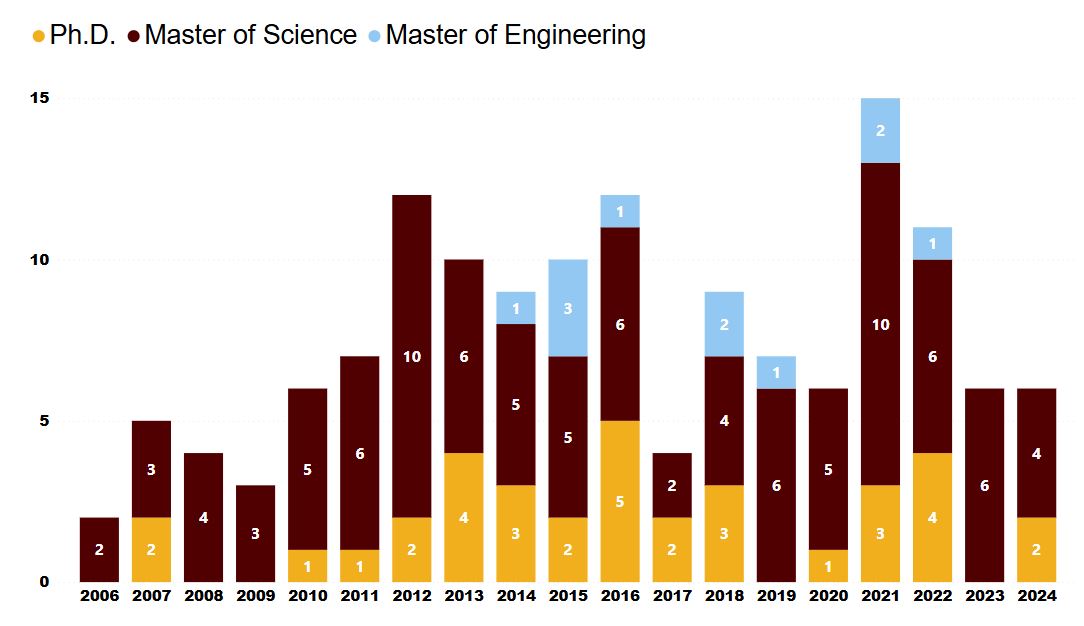
NSSPI students have unique opportunities for research, education and professional development. NSSPI students participate in foreign field experiences, present their research results in national and international forums, and have premier internship opportunities at national laboratories.
NSSPI faculty and students established at Texas A&M the first student chapter of the Institute of Nuclear Materials Management (INMM). Students working on NSSPI-sponsored projects also are members of both the Student INMM chapter and the International INMM chapter. As members of the organization, our students have opportunities to present research projects, publish articles and immerse themselves in the professional nuclear nonproliferation culture supported by laboratories and governments around the world. See a directory of our NSSPI graduates.
Degrees Earned by NSSPI Students* by Year
 *NSSPI students are students who were advised by NSSPI faculty members. NSSPI has supported students in many other research groups and departments, as is partly reflected in the list of theses and dissertations.
*NSSPI students are students who were advised by NSSPI faculty members. NSSPI has supported students in many other research groups and departments, as is partly reflected in the list of theses and dissertations.
Student News
 NSSPI Student Investigates Neutron Detection System Solutions Beyond Helium-3 - Current thermal neutron detection systems often rely on helium-3, a scarce and increasingly expensive resource. Moreover, helium-3 detectors operate under high pressure and require high applied voltages, complicating logistics and deployment. Center for Nuclear Security Science and Policy Initiatives (NSSPI) student Dr. Nicholas Wehmann’s doctoral research explored innovative alternatives to conventional neutron detection technologies by […]
NSSPI Student Investigates Neutron Detection System Solutions Beyond Helium-3 - Current thermal neutron detection systems often rely on helium-3, a scarce and increasingly expensive resource. Moreover, helium-3 detectors operate under high pressure and require high applied voltages, complicating logistics and deployment. Center for Nuclear Security Science and Policy Initiatives (NSSPI) student Dr. Nicholas Wehmann’s doctoral research explored innovative alternatives to conventional neutron detection technologies by […] INMM Student Chapter and NSSPI Organize Workshop on PBR and TRISO-Fueled Reactor Nonproliferation - The Center for Nuclear Security Science and Policy Initiatives (NSSPI) and the Texas A&M University Student Chapter of the Institute of Nuclear Materials Management (INMM) hosted the Pebble Bed and TRISO-Fueled Reactor Nonproliferation Workshop from February 3–6, 2025. The workshop attracted over 40 technical and policy experts who discussed critical nonproliferation and safeguards challenges associated […]
INMM Student Chapter and NSSPI Organize Workshop on PBR and TRISO-Fueled Reactor Nonproliferation - The Center for Nuclear Security Science and Policy Initiatives (NSSPI) and the Texas A&M University Student Chapter of the Institute of Nuclear Materials Management (INMM) hosted the Pebble Bed and TRISO-Fueled Reactor Nonproliferation Workshop from February 3–6, 2025. The workshop attracted over 40 technical and policy experts who discussed critical nonproliferation and safeguards challenges associated […] NSSPI Student’s Research Advances Portable Neutron Detection for Nuclear Security and Emergency Response - The MC-15 is a portable neutron multiplicity detector critical for nuclear safeguards, emergency response, and research. It enables the accurate analysis of neutron-producing systems to ensure safety and support decision-making in complex scenarios. Hadyn Kistle, a doctoral student with the Center for Nuclear Security Science and Policy Initiatives (NSSPI) at Texas A&M University, investigated ways […]
NSSPI Student’s Research Advances Portable Neutron Detection for Nuclear Security and Emergency Response - The MC-15 is a portable neutron multiplicity detector critical for nuclear safeguards, emergency response, and research. It enables the accurate analysis of neutron-producing systems to ensure safety and support decision-making in complex scenarios. Hadyn Kistle, a doctoral student with the Center for Nuclear Security Science and Policy Initiatives (NSSPI) at Texas A&M University, investigated ways […]